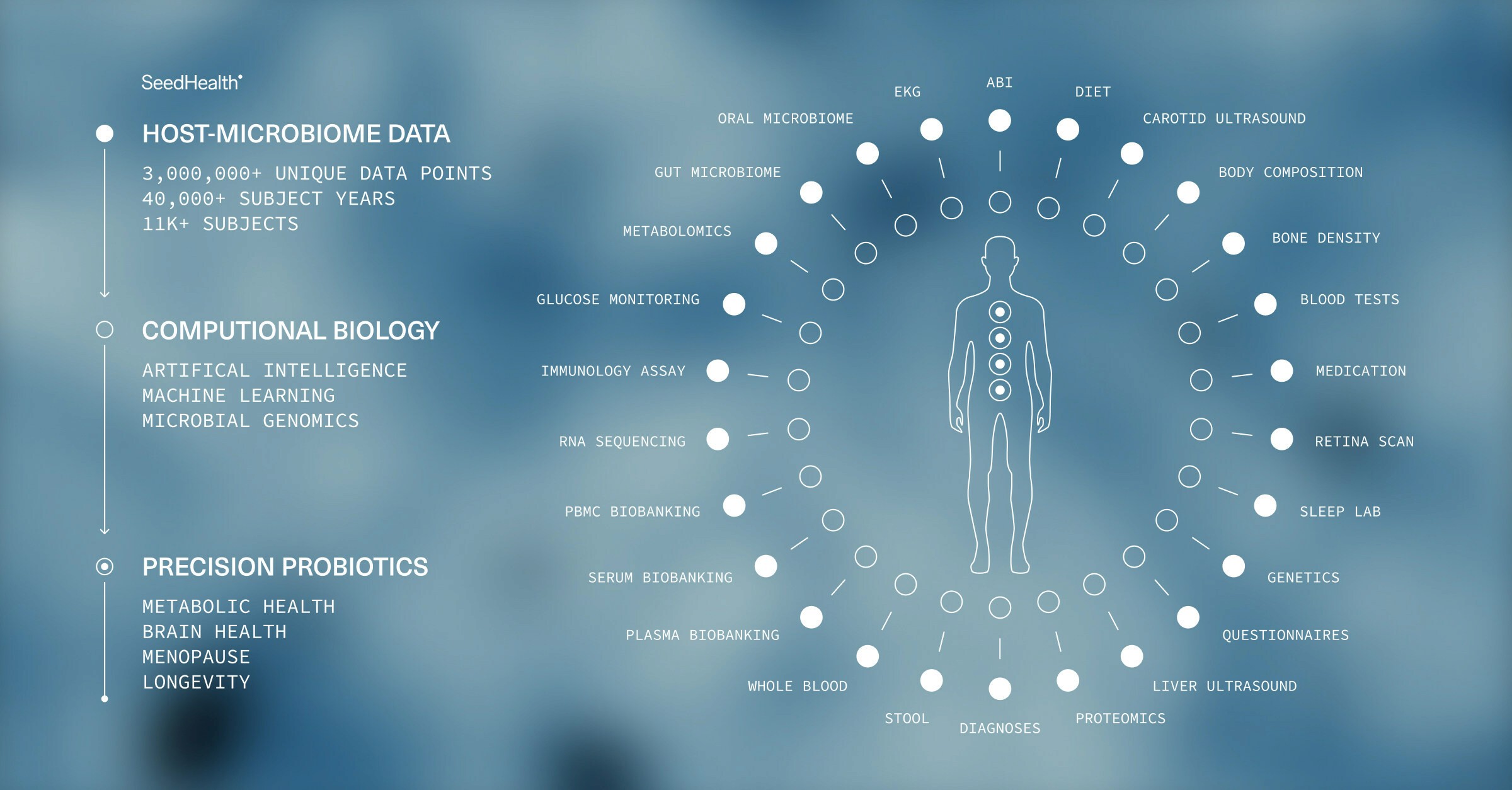Engineered Human Therapies
How A Multi-Omics Platform is Transforming Microbiome Research and Healthcare
Seed Health unveils CODA, a computational biology platform leveraging the world's largest multi-omics dataset to develop precision probiotics and targeted health interventions
Seed Health, a leader in microbiome science, has unveiled its latest innovation, the CODA platform, a cutting-edge tool in the field of computational biology for developing next-generation precision probiotics and microbiome-directed health interventions. The launch of CODA marks a significant advancement in understanding the intricate relationships between the human microbiome and various health outcomes. The platform operates on data from the Human Phenotype Project, the most extensive multi-omics data compilation to date, spearheaded by Professor Eran Segal, a renowned computational biologist at the Weizmann Institute of Science.
Exploring New Frontiers in Microbiome Research
CODA integrates over three million phenotypic data points collected from more than 13,000 individuals throughout 40,000 cumulative subject years. This extensive dataset merges microbiome analysis with genetic, immune, metabolomic, and proteomic data. Such a multidimensional approach not only captures the diversity of human health factors—ranging from biological and environmental influences to lifestyle and medical history—but also facilitates a deeper understanding of the microbiome's role in health and disease.

Raja Dhir, Co-Founder of Seed Health, highlighted the platform's scope and potential. "Our CODA platform is tracking the health data of tens of thousands of individuals over decades, offering a comprehensive, multi-omics perspective," Dhir said. "This allows us to uncover and address critical connections between the microbiome and health, enabling the creation of targeted interventions to improve outcomes across diverse populations."
Technological Enhancements and Real-World Impact
The integration of CODA into Seed Health’s existing capabilities significantly enhances its computational microbiome analysis across various bodily microbiomes, reinforcing the company's mission to translate microbiome research into tangible health benefits.
CODA's novel dataset provides unprecedented insight into the microbiome’s complex interactions with key biological systems such as the gut-brain, gut-heart, and gut-liver axes. It also introduces organ-specific clocks to determine the diverse aging rates of different organs within an individual, distinguishing between biological and chronological age. Professor Segal emphasized the transformative potential of these developments. "Our development of organ-specific clocks has revealed the microbiome's extraordinary capacity not just to predict but to actively shape health outcomes across key biological systems," Prof. Segal noted. "CODA empowers the transition from insight to action, enabling the creation of interventions that target health outcomes across these different organ systems to support lifelong health."
Expanding Research and Consumer Health Products
CODA utilizes microbial genomics to identify specific bacterial genes and employs network effect analysis to understand these microbes within their ecosystems. Advanced AI and machine learning algorithms process the vast amounts of data, including 200TB from the Human Phenotype Project.
Initial programs under CODA span several critical areas of health:
Metabolic Health: Recent studies published in top scientific journals such as Nature Medicine and Nature Communications have highlighted the correlation between microbial genes and body weight and how diet affects metabolic parameters through the microbiome. These findings are being translated into consumer health products.
Brain Health: CODA explores significant interactions between dietary compounds and the microbiome, impacting brain health. Early results emphasize the role of microbial metabolites in brain development and function.
Longevity and Menopause: The platform also focuses on the nuances of biological and chronological age, particularly during menopause, and aims to develop interventions to support long-term health and mitigate menopause-related symptoms.
Dirk Gevers, Ph.D., Chief Scientific Officer of Seed Health, shared his enthusiasm about the platform's capabilities. "CODA enables the development of next-generation precision probiotics in a uniquely powerful way," said Dr. Gevers. "Rather than relying on a few biomarkers in isolation, CODA empowers us to examine them within a network of hundreds of other biological data points. This comprehensive approach allows us to unravel the complex interactions between diet, supplementation, the microbiome, and multi-system human health more effectively than before."
Ara Katz, Co-CEO and Co-Founder of Seed Health, also commented on the platform's broader implications. "CODA significantly expands our platform's capacity to realize the full promise of the microbiome," Katz stated. "With a deeper and more nuanced understanding of the microbiome's role in human health, we are better positioned to translate these breakthrough research findings into interventions that have a meaningful impact on human health globally."


















